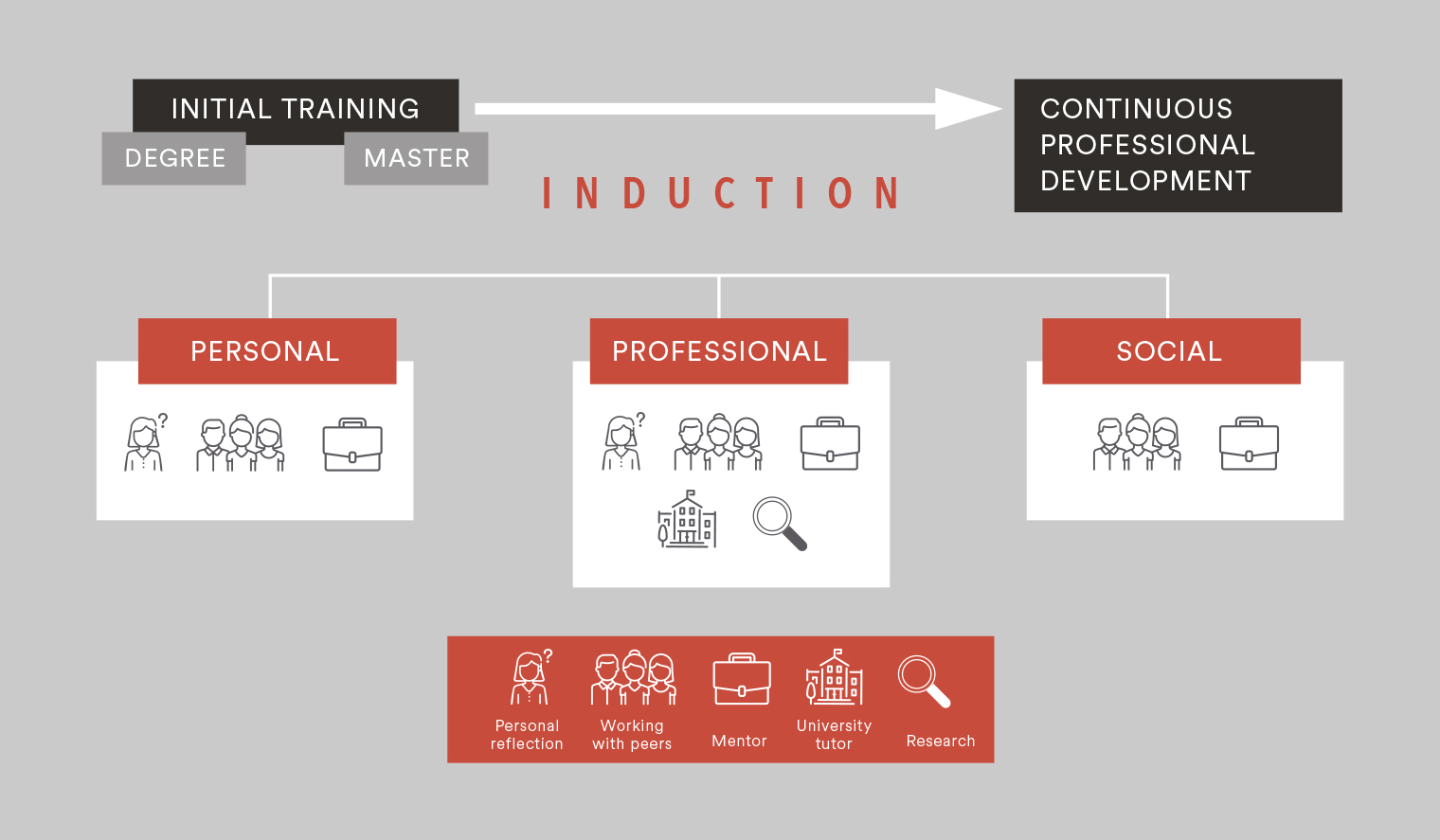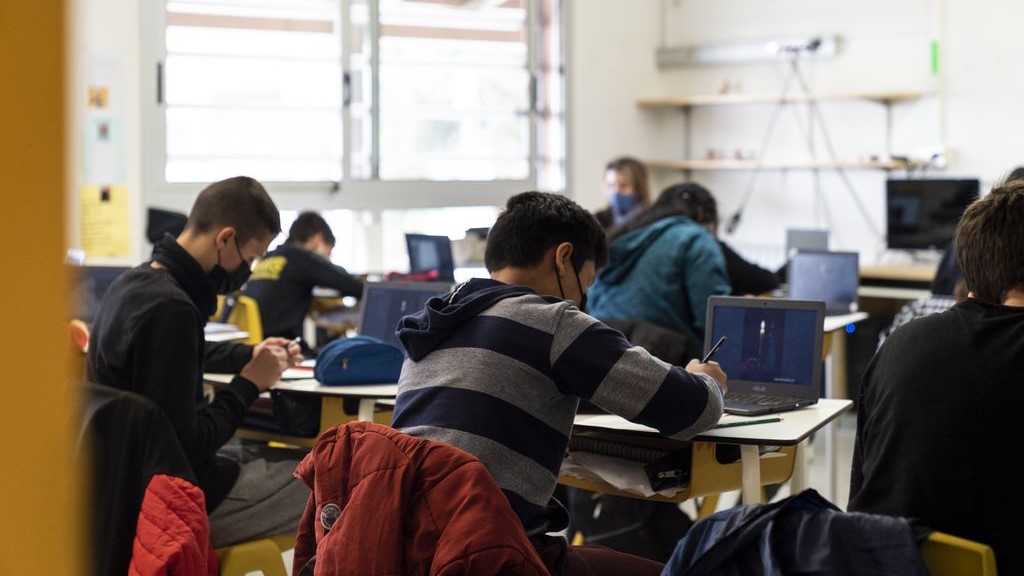A Foundation Programme for teachers? Induction as part of teacher training and accreditation
23/02/2022
Miquel Martínez is a full professor and member of the GREM research group of the University of Barcelona. Ana Marín is a researcher and analyst in international pedagogy. Both have shared coordinating tasks for the Teacher Training Improvement and Innovation Programme in Catalonia (MIF) between 2013 and 2018.
Studies reveal that teacher quality significantly determines the educational opportunities of students. It has also become clear that a substantial element of teaching quality depends on how new teachers are trained in the early stages of joining a school, in contexts of actual professional practice. This is known as “teaching induction”.
Unlike other countries such as England, Estonia or Germany, Catalonia has given scarce consideration to the induction of new teachers. Beyond the attitudes and the vocation of teachers, it is important to prepare teachers for the school’s mission in today’s society. Consequently, the transition from initial training to teacher accreditation through induction is one of the main challenges we face.
Why is teaching induction important?
Because in the current context, new challenges are appearing that teachers must know how to address. These challenges require practical training and cannot always be covered during the initial training period, no matter how good it may be.
For this reason, it is necessary to move towards a model of initial training and professional teaching development that combines the period of initial teacher training with an induction period for novices in schools. This combination must enable teachers to be trained and to start their professional activity by participating more intensively in contexts of quality work placements.
As much as there is a practical component in initial teacher training, induction through a school placement promotes a more genuine introduction to the teaching profession.
Just as there are aspects of the more theoretical training and professional culture that cannot be achieved without space and time for reflection and study, we know that certain aspects of learning cannot be built if they are not put into practice.
The practical component makes fundamental sense throughout the entire training process of future teachers and it is – or should be – undertaken through various modes and with varying intensity during the different stages of the study programme. However, during the induction period this practical component is even more fundamental because it ensures that the introduction to the teaching profession is not an unfamiliar process. It reduces the shock of the “staging” and allows for a true understanding of reality, as well as for thorough support in order to become professionally independent and a reduction of uncertainties when facing the classroom setting, students, their families and colleagues.
An induction period reduces the shock of the “staging” and allows for a genuine understanding of classroom reality.
Induction programmes should not, under any circumstances, lead to a reduction in initial training placements, although they can help to review the various types of placements over the course of the study programmes. In any event, and in order to ensure the quality and satisfactory completion of the induction period, a common policy and a reference framework are needed for teaching skills according to the various training phases.
Because induction and mentoring programmes provide invaluable help to novices – if one is able to capitalise on the opportunity – by enabling identification of both their strengths and weaknesses in terms of knowledge, skills, attitudes and values which may warrant extra training.
The presence of good pre-induction training is important, but no matter how good it is we cannot expect it to serve as a preparation for all of the challenges novices will encounter in their first teaching job. Induction programmes entail addressing these challenges and also emerging school and social issues of the day. Last but not least, they can also be good indicators for universities to improve the quality of education for their graduates.
In addition to the academic education that combines theory and practice, to work as a teacher it is necessary to undertake a one-year period of residency training in a school.
We therefore consider that in order to practice as a teacher in any school, in addition to the academic training that combines theory and practice it is necessary to undertake a one-year period of residency training in a school. It should be a period of training and learning assessment for novice teachers prior to their employment in a school, inclusion in the supply teacher pool and, above all, access to the teaching role. In the case of an unfavourable assessment, it would be appropriate to provide participants with further training proposals in order to improve their qualities as teachers.
Considerations for a good induction system
An induction programme can be approached at many levels, from giving schools the independence to implement their own induction process through to a nationwide focus.
Since in our case teaching is a regulated profession, induction programmes have to guarantee unrestricted flexibility and mobility of teachers; therefore, it is necessary that the programme is shared, formalised and acknowledged by all communities and nationwide, taking into consideration the different paces and initiatives for its implementation and the characteristics and idiosyncrasies of each community.
Induction objectives:
An induction programme may have several functions and may even be determined by the timing of its implementation (European Commission, 2010). Essentially:
- If the induction programme is aimed at new teachers who have completed the initial teacher training, have obtained the relevant official qualification and also the relevant licence or permit to teach, the purpose of the programme is to focus on the improvement of the skills of the teachers.
- If the induction programme is aimed at new teachers who hold the qualification but do not yet have a licence to teach, the nature of the induction will focus more on accreditation in order to verify teaching abilities and the decision regarding entry into the profession.
- Lastly, if the induction programme is aimed at teachers who are not qualified or licensed to teach, the separation between the initial training and the induction becomes distorted and the programme itself may become an extension of the training.
Current regulation of initial teacher training – bachelor’s degree level for teachers and short master’s degree level for lecturers – places the induction period after the bachelor’s or master’s degree and with a duration of one academic year. If the structure of the initial training consisted of 180 degree credits and 120 master’s degree credits for all teachers, as we have proposed on various occasions, the induction period could involve the final year of the Master’s degree, with entry depending on the number of places according to the needs of the education system and a value equivalent to 60 credits, undertaken through cooperation between authorities and universities.
Regardless of the time of its implementation, every induction period must enhance the professional development of the future teacher, providing support on three levels:
- At a personal level, support must be given to novices to develop their identity as teachers and overcome difficult situations they encounter in the first months and years, when confidence is lower and there is increased anxiety and stress.
- At a professional level, the novices’ skills must be developed. This support must focus on the development of skills to be able to manage coexistence and classroom dynamics and to expand knowledge of the contents of their teaching and the strategies for learning and teaching.
- Lastly, at a social level, the induction programme must provide support to novices to form part of the school and professional community in an environment of collaborative learning in the school and between stakeholders of the education system such as families and the surrounding community.

Assessment and mentoring system
Since one of the main objectives of an induction programme is the improvement of teachers’ abilities and skills, as well as to provide more comprehensive practical understanding and more school knowledge than can be learnt and experienced during the qualification internships, it is necessary to have an accurate, thorough assessment system to guarantee these goals are reached.
Induction cannot consist of a period of additional placements; rather, it should be a period of support that is rich in experience and reflection about the practice.
Assessment should be maintained throughout the entire period and should integrate self-assessment and internal and external assessment. It should also contribute to the assessment being considered a common, necessary practice throughout professional development. In this respect, it is necessary to benefit from school mentoring plans and to be particularly careful when selecting and training mentors.
Induction cannot consist of a period of additional placements, like those already undertaken and necessary in the initial training; rather, it should be a period of support that is rich in experience and reflection about the practice.
Along these lines, it is necessary for the mentoring plan to be guaranteed by novices training centres as a component of their school educational project, with mentors trained appropriately for their work. This is a task that must be acknowledged financially, but above all in terms of working time dedicated to planning, preparing and carrying out the relevant mentoring tasks.
For the task of mentoring, it is advisable to have teachers with proven experience and retired teachers and professors should not be overlooked.
For this task it is advisable to have teachers with proven experience, involved in movements for pedagogical renewal. Furthermore, retired teachers and professors should not be overlooked. At the same time, it is necessary to pay particular attention to the profile, attitudes and aptitudes of the individuals who carry out the mentoring tasks.
It should be noted that the function of mentoring is not merely to welcome and provide support, nor indeed simply to train, and that its goal is not the final assessment and accreditation of the teacher. On the contrary, mentoring should be understood as a host of activities that a teacher with more experience engages in with a novice.
These actions must engender a network of relations which instil confidence in novices, offering them occasions and time for reflection on their practice, as well as points of reference from the mentor and feedback to encourage improvement as a professional. Knowing how to navigate this pull between providing support, stimulating novices’ improvement, and correcting and offering feedback on their work is a key element in the function of mentoring and the wellbeing of novices.
Finally: linkage with other phases of professional development
Implementation of an induction programme cannot be a phase that is independent and disconnected from all other elements that form part of professional teaching development; it must be another phase of the continuum that links previous training, entry into the profession and continuing training.
This entails maintaining a close, direct relationship with the competent institutions responsible for the other phases to ensure that the transitions are smoother and, at the same time, that the process is enriched and improved with the feedback between the different phases. Involvement, engagement and cooperative work between all participants involved are crucial to accomplishing this link.
This induction period must be taken into consideration in the selection and evaluation of the merit-based exercises and/or competitive examinations that are in place and, therefore, it is necessary for it to be properly assessed and remunerated.
Would you like to find out more?
- Read the chapter of the 2018 Yearbook From initial training to the teaching profession: induction to teaching (original in Catalan)
- Watch the video Ensuring the quality of novice teachers: the induction - Miquel Martínez and Ana Marín (original in Catalan)
Photo: Martí Petit // Barcelona City Council
